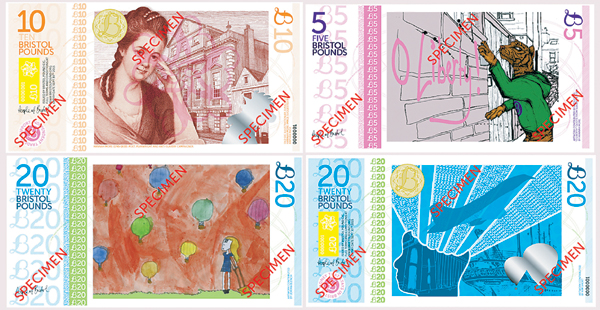
As Britain loses faith in its banks and feels shockwaves from the eurozone debt crisis, one city is trying to keep local wealth in local pockets with the launch of its own currency.
The Bristol pound - usable only with member businesses in the city in southwest England - will launch in September, and organizers have been deluged with local firms wanting to sign up.
"The perception of banking and money is that it's a very ruthless system: People are out for what they can get," co-founder Ciaran Mundy told AFP. "This is about saying yes to something new. It's tapping into a different set of values about money."
The scheme has "captured people's imaginations", he added, in a recession-hit year when British banks have been beset by scandals and ministers talked openly of a possible euro collapse.
Hundreds of businesses have joined, from the acclaimed Arnolfini arts center to the Chandos deli chain, and the launch had to be postponed from May to September 19 because of the level of interest.
Security professional Richard Wright signed up his company Wright Guard as soon as he heard about the Bristol pound, hoping it would help him fight back against encroaching security giants.
"I'm Bristol born and bred, and I always want to support local businesses," he said. "I'll want to keep the Bristol pound flowing."
The notes feature symbols of local pride, from 19th-century religious writer Hannah More to the Concorde aircraft, partly developed in Bristol, and images of the St Paul's Carnival Caribbean street festival.
Other British towns have launched local currencies, but Bristol, home to half a million people, is the first big city to do so, and its scheme is ambitious.
Businesses can pay local taxes in Bristol pounds and the council has offered its 17,000 employees the option of receiving part of their pay in the currency.
Mundy's team has designed an electronic system for payments by text message, plus what they say are forgery-proof notes.
Stores selling products from cider to skate shoes said they were considering joining the scheme, which Mundy believes will have a tangible economic effect.
"Eighty percent of the money leaves the area if it is spent with a multinational - but 80 percent stays if it is spent at a local trader," he said.
 |
|
The launch of the Bristol pound, usable only with member businesses, has been delayed until September because of the high level of interest. The currency will not be legal tender and must be exchanged through the Bristol Credit Union. [Photo/Agencies] |
Skeptics, supporters
Such localism might seem strange in a city that grew to prosperity as an international port and is now a center for aircraft manufacture.
But Bristol is also a left-wing haven with an activist tradition. The People's Republic of Stokes Croft, an urban renewal group, made headlines last year with a campaign that became a riot in protest against the opening of a Tesco supermarket.
They have greeted the Bristol pound warmly.
"We need to run things from the bottom up and from the grassroots, so that people have control over how things happen where they live," said spokesman Chris Chalkley.
But Ben Yearsley, investment manager at Bristol-based financial services firm Hargreaves Lansdown, won't be rushing to convert his sterling.
"It's just a big gift voucher scheme ... I'm skeptical that it's going to make any difference," he said. "Local businesses need to compete on quality and service."
The Bristol pound will not be legal tender and must be exchanged through the Bristol Credit Union, with a 3 percent charge for conversion back to sterling. This and charges on electronic transactions will pay its running costs.
Mundy hopes hundreds of thousands of Bristol pounds will be traded in its first year, increasing to "double figures of millions" by the third.
His model is the Chiemgauer, a German complementary currency of which millions are traded in euros yearly.
The online database complementarycurrency.org lists more than 225 such minority currencies worldwide, of which 102 are in Europe.
They have won a high-profile advocate in Bernard Lietaer, a Belgian economist who helped design and implement the convergence mechanism for the euro.
"We will never have a stable, sustainable monetary system with a single monopoly of a single type of currency, whoever manages it," he said.
Agence France-Presse in Bristol, United Kingdom